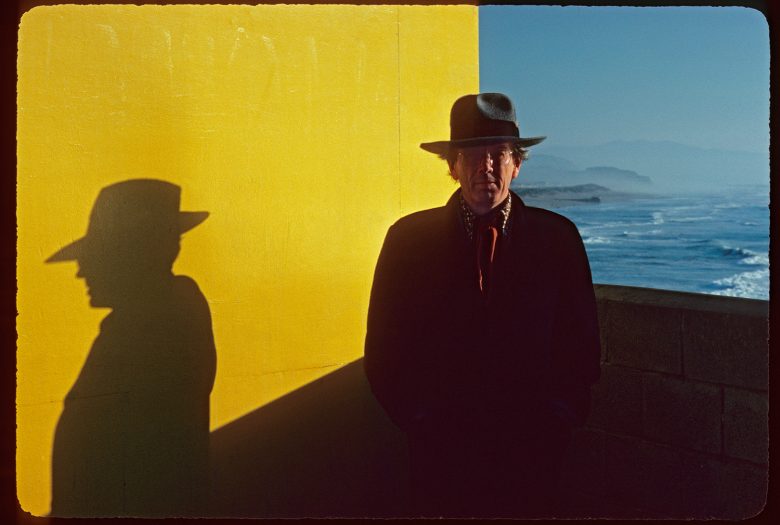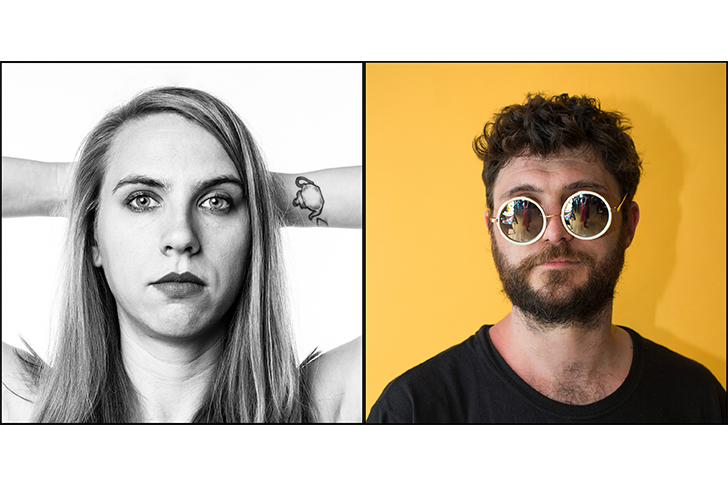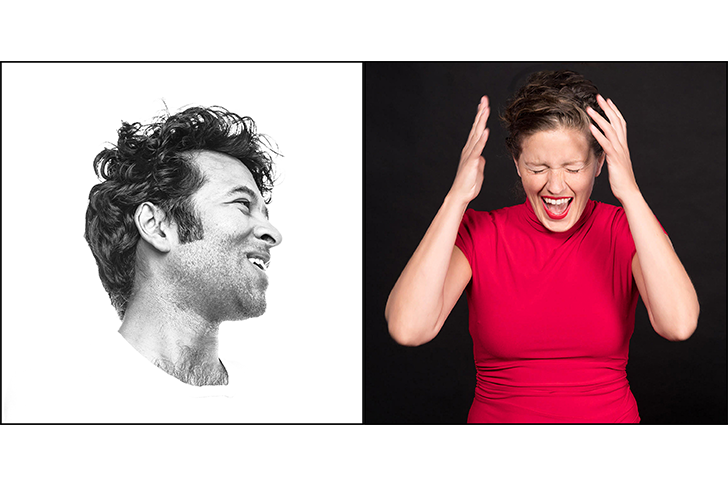This new production of eL/Aficionado by the late Robert Ashley (written in 1987 and last performed in 1995) is an opera scored for four voices and a pre-recorded electronic orchestra.
It is the story of a person on trial — on trial for her character and the quality of her answers, on trial for her skills of perception and her intelligence, on trial as a human being. The principal character (the Agent) is being cross-examined by two persons (Interrogators) under the direction of a third person (First Interrogator), who directs the narrative and comments on the Agent’s answers throughout the opera. The Agent is required to recount her actions and explain her behavior in carrying out certain assignments. She does not explain whom she works for, or even why she does what she does, but she is expected to respond without question to some deep obligation or contract with the past.
Although the opera’s mysterious mood owes much to John LeCarré’s world of espionage, it is not a spy story. The four scenes of the narrative are progressively concerned with events of an otherworldly nature while delving into the Agent’s different life stages, from the present time to her earliest memories. Throughout the First Interrogator’s remarks, there are passing references to analysis and to the world of dreams. eL/Aficionado is the trial of a mind or an imagination, of “every person” coming in contact with something foreign — the unknown.
Kayleigh Butcher will sing the lead role of the Agent. The other vocalists are Bonnie Lander, Paul Pinto, and Brian McCorkle. Music direction and sound design are by Tom Hamilton, and lighting and stage design are by David Moodey.
Robert Ashley (1930–2014) is particularly known for his work in new forms of opera. In Ann Arbor in the 1960s, Ashley organized the ONCE Festival and directed the legendary ONCE Group, with whom he developed his first operas. Throughout the 1970s, he directed the Center for Contemporary Music at Mills College and toured with the Sonic Arts Union. He produced and directed Music with Roots in the Aether, a 14-hour television opera/documentary about the work and ideas of seven American composers. His opera for television, Perfect Lives, is widely considered the precursor of “music-television.” Stage versions of Perfect Lives, Atalanta (Acts of God), Improvement (Don Leaves Linda), Foreign Experiences, eL/Aficionado and Now Eleanor’s Idea toured throughout the US and Canada, Europe and Asia during the 1980s and 90s. Dust, followed by Celestial Excursions and The Old Man Lives in Concrete toured from 1999–2012. He finished his last two operas (Crash and Quicksand) in 2013. Crash was presented as part of the 2014 Whitney Biennial; The Kitchen presented Quicksand in early 2016. www.robertashley.org
Described as having “a sound that is well-suited for the strange world of new music” (Chicago Classical Review), Kayleigh Butcher (mezzo-soprano) has gained critical and audience acclaim as a soloist and contemporary chamber musician. She is a founding member and the director of Quince Ensemble, an all-female, a cappella vocal quartet that explores experimental vocal techniques and improvisation. Quince has performed on many contemporary series, festivals, and at prestigious venues such as HERE Arts, Chicago’s Ear Taxi Festival, Chicago’s Pritzker Pavilion in Millennium Park, Stanford University, Northwestern’s NUNC, Issue Project Room, University of Michigan’s Hill Auditorium, and NYC’s SONiC Festival at Shapeshifter Lab. She is also a founding member of Shepherdess, a violin and voice duo, and LOVELOVELOVE, a vocal trio with fellow Robert Ashley cohorts, Paul Pinto and Bonnie Lander. She currently resides in Brooklyn. www.kayleighbutcher.com
Tom Hamilton has combined the activities of audio production and music composition into an artistic career of over five decades. Since 1990, Hamilton has been a member of the composer Robert Ashley’s touring opera ensemble, performing sound processing and mixing in both recordings and concerts. He has served as Music Director in productions of Ashley’s operas Crash, Improvement, and eL/Aficionado, and composed and produced the music for productions of Ashley’s Quicksand and A Futile Stab at Fun. His audio production is found on over 100 recordings of prominent contemporary musicians. Hamilton’s music references the 1970s era of analog electronics, and contrasts structure with improvisation and textural electronics with acoustic instruments. He employs “aural scores” to connect performers to a changing context of electronic sound, prompting the use of “present-time listening” by both performer and listener. Hamilton is a Fellow of the Civitella Ranieri Foundation, and his work has been awarded in the Prix Ars Electronica. www.lovely.com/artists/a-
Bonnie Lander is a multifaceted professional musician whose career encompasses performance, curation, composition, and improvisation. Immersed in the eclectic world of new and experimental music, she has performed in a great variety of concert programs, with a wide selection of collaborators in improvised music, new opera, new chamber music, and composition. Versatile, dramatic, with a “stratospheric legato” and a “signature ability to embody a seemingly endless supply of vocal timbres and personalities,” Lander combines an intuitive, spontaneous use of the voice with resonant operatic technique, in order to create a performance experience that is virtuosic, intimate, and sonically overwhelming. Lander is a founding member of Rhymes With Opera, a NYC based chamber opera company now in its 12th year of programming new works for the operatic voice. www.bonnielander.com
Brian McCorkle is a composer, performer, co-Director of the Panoply Performance Laboratory (PPL) and a founding member of Varispeed Collective. His collaborations with Varispeed have been praised by The New York Times as “impressive,” and Posture Magazine calls his voice “chillingly resonant.” He performs regularly as a multi-instrumentalist and vocalist, flouting genre while drawing from decades of experience as a professional musician in a wide array of contexts while also making electronic instruments combined with sculptures made by Esther Neff. McCorkle’s work with PPL has been described by The Guardian as “working to distill a bevy of sophisticated ideas into word and action.” brianmccorkle.work
David Moodey has collaborated with Robert Ashley since 1999, most recently designing for the remounting of Ashley’s Improvement (Don Leaves Linda) at The Kitchen. He is the principal designer and production manager for Molissa Fenley and Robert Ashley. His design for Fenley’s State of Darkness earned him a Bessie award for lighting design. He designed for Peter Boal’s three seasons at the Joyce Theater, New York, and in 2017 for a production of John Henry Redwood’s play The Old Settler, directed by Michele Shay at the Billie Holiday Theater in Brooklyn. He has also designed lights and sets for over a dozen shows at NYU’s Experimental Theatre Wing since 2000. He currently holds an International Alliance of Theatrical State Employees Local One position with Jazz at Lincoln Center as one of the heads of the Appel room. www.davidmoodey.com
Paul Pinto is a composer, writer, and multi-disciplinary performer. He founded the music collectives thingNY and Varispeed with whom he creates immersive, durational, and dramatic chamber and electronic music. His latest albums include Patriots with Jeffrey Young, Empty Words with Varispeed, and Robert Ashley’s Improvement. As a vocalist, Paul works on a diverse array of new projects, including performing Peter Maxwell Davies’ Eight Songs for a Mad King, originating the role of “Balaga” in the Broadway musical Natasha, Pierre and the Great Comet of 1812, and in his own work including the opera Thomas Paine in Violence with Joan La Barbara, and the Resonant Bodies Festival commission of 15 Photos. This year includes commissions for Iktus Percussion, Quince, Kathleen Supove, The Rhythm Method, and Shepherdess, guest artistic curator for the MATA Festival and directing thingNY’s remount of the opera ADDDDDDDDD. www.pfpinto.com



